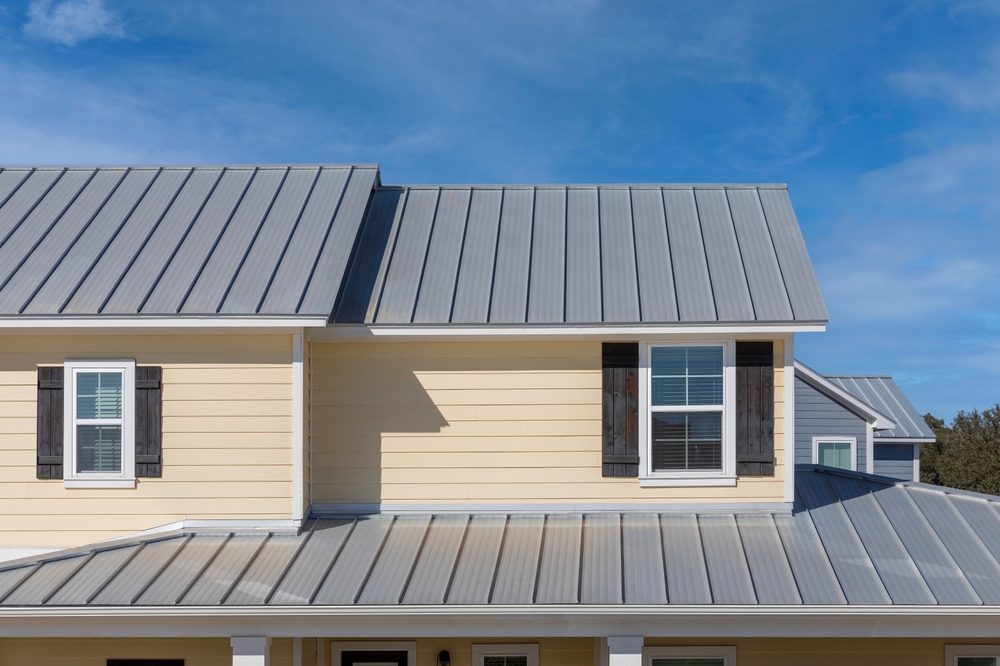There are a few common concerns out there among those who are considering a metal roof for their home or building, and one of these is in regard to metal’s conductivity. Specifically, it’s commonly asked as such: Do metal roofs attract lightning?
At Mid Michigan Metal Sales, we’re here to supply clients around Michigan with the very best metal roofing shingles, metal roofing panels and other metal roofing products, helping with any new roof setup you’re interested in. We’re here to tell you that no, metal roofs do not attract lightning in any more significant way than any other roofing material – and furthermore, metal roofs actually hold several major advantages when it comes to lightning protection for your entire structure. Here’s a primer on why this is the case, and why increased lightning risks are not present with a metal roof.
Metal is Conductive – But Not for Lightning
The reason why so many people ask about lightning risks with metal roofs is understandable: Metal is known for its conductivity, and this can be a major cause for concern with electrical systems or other similar areas. However, when it comes to lightning, the truth is that metal’s conductivity is not really a major factor in whether or not your roof will attract strikes.
The reality is that lightning will strike wherever it wants – regardless of what material is present. Metal roofs do not inherently attract lightning strikes any more than other roofing materials. In fact, the likelihood of a metal roof being struck by lightning is actually lower than some other common roofing materials, such as wood or asphalt shingles.
The Role of Height
What many people don’t realize is that the height of the structure is actually a much larger determining factor in whether or not lightning will strike it. Tall structures such as trees, towers or other high buildings are much more likely to be struck by lightning due to their height and the increased likelihood of the lightning’s path crossing their location.
When it comes to a house or building with a metal roof, the roofing material itself is typically not tall enough to make a significant difference in attracting lightning. In fact, a metal roof may actually be safer as it can act as a conductor for the lightning strike, helping to safely direct it away from the structure and reduce potential damage.
Other Land Features
There are also certain other topographical features that can impact the likelihood of lightning strikes, such as open fields or large bodies of water. These areas are more likely to attract lightning strikes and pose a greater risk.
But overall, the reality is that metal roofs do not present any greater risk for lightning strikes than other roofing materials. In fact, they may actually offer some protection – we’ll go over how this works in our next couple sections.
Metal Roofs and Fire Resistance
In any case where lightning does strike a structure, the biggest concern is always fire. And in this area, metal roofs have a significant advantage over other roofing materials.
Metal roofs are highly resistant to fires caused by lightning strikes. Due to their non-combustible nature and lack of flammable materials, they do not offer any fuel for a potential fire. This can be a major advantage in areas with a higher risk of lightning strikes or for those looking to have peace of mind in case of a strike.
Ease of Lightning Rod Installation
Another advantage of metal roofs when it comes to lightning protection is the ease with which a lightning rod can be installed. Lightning rods are an important part of any structure’s lightning protection system, and with a metal roof, they can be easily attached without needing to penetrate or damage the roof itself.
In contrast, other roofing materials may require more extensive installation methods for lightning rods, potentially causing damage and requiring additional repairs.
Increasing Roof Lightning Protection
If you’re in a lightning-prone area or are simply looking for additional protection, there are also several steps you can take to further increase your metal roof’s lightning protection. These include:
- Lightning rod: As we just noted, lightning rods are an important part of any structure’s protection system. Consider adding one to your metal roof for added safety.
- Grounding: Aside from a lightning rod, proper grounding is also crucial in protecting against the potential damage caused by a lightning strike. Ensure that all electrical and phone lines on the structure are connected to a quality grounding system.
- Surge protector installation: Surge protectors can also provide additional protection against lightning strikes, and are recommended for any structure in a high-risk area.
- Proper maintenance: Keeping your metal roof well-maintained is another key factor in preventing potential damage from lightning strikes. Regular inspections and repairs as needed will help keep your roof functioning at its best and provide added protection.
At Mid Michigan Metal Sales, we assist all our clients around Michigan with high-quality metal roofing products. Contact us today to learn more.


